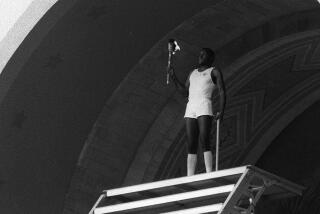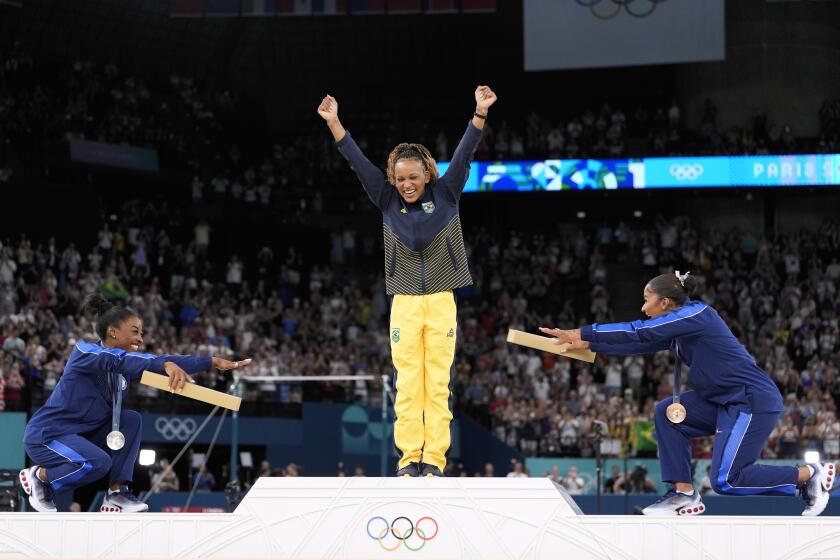THE SEOUL GAMES / DAY 5 : PARTING SHOTS : Assistant Shares Pain of Blunder After Boxer Loses Final Appeal
Hank Johnson, the assistant coach sharing the blame for U.S. boxer Anthony Hembrick’s showing up too late for his Monday bout against a South Korean, looked like a man who wanted to drop through a trapdoor.
About 15 U.S. reporters found him in a hallway at Chamshil Students’ Gymnasium Tuesday, shortly after the final appeal on Hembrick’s behalf had been denied.
“Monday was the worst day of my life,” said Johnson, near tears.
“I’m the one who gave him the news. I said: ‘We didn’t get the decision,’ and as long as I live, I’ll never forget the expression on his face. It was an expression like he’d heard a (bad) joke. But I know him well enough to know how bad it hurt, deep inside.”
Johnson, a 40-year-old Army sergeant, paused, gathered his thoughts, then continued, speaking quietly. He talked about how he and Coach Ken Adams had misread the bout schedule, miscalculating the time of Hembrick’s bout by nearly 2 hours.
And he talked about the pain he and Adams will carry, as will Hembrick.
“Athletes depend totally on their coaches,” he said.
“Most of them have total trust in their coaches. Nothing was more important in this young man’s life than to win a gold medal.
“We wanted Anthony to win a gold medal, too.”
Johnson compared Hembrick’s heartbreak to his own, 16 years ago.
“I was in the Olympic trials in ‘72,” he said. “I thought I was going to make the team, and a guy hit me just as I slipped. I went down, unhurt, got up and the referee stopped the bout,” he said.
“So, I can still remember how bad that hurt. But this! Hey, Anthony was here . This is the Olympics. He got here, and because Kenny and I . . . “
Johnson could only shake his head.
Adams, in a news conference, again said: “I have to accept full responsibility because I am the head coach.”
Adams said he had been trying to reduce the time U.S. boxers would have to spend in relatively small Chamshil Students’ Gymnasium.
“There are no areas where boxers can relax before their bouts, no place for a little privacy,” he said. “The holding room they put the boxers in--it’s packed, people smoking . . . So we were trying to take our kids over there as close to the bouts as we could without cutting it too close.”
Rolly Schwartz of Cincinnati, a U.S. amateur boxing official for 50 years, said Wednesday that the incident would not have happened if Pat Nappi had been coaching.
Nappi was the head coach of the 1976, 1980 and 1984 Olympic teams. Schwartz was the team manager of the 1976 team.
“Kenny’s a good coach, and I feel bad for him, but I don’t care how many years you’ve been a boxing coach, when you go to the Olympics, you’re a rookie,” Schwartz said.
Schwartz said that the mishap will serve as a lesson for U.S. Olympic teams.
“In 1956, in Melbourne, we lost 2 kids on the scales (they failed to make weight),” he said.
“Ever since then, at every Olympics and World Championship tournament, it’s policy that our kids make weight the night before, even if they have to run until midnight. That way, they can sleep easily, with no fears about making weight the next morning.”
More to Read
Go beyond the scoreboard
Get the latest on L.A.'s teams in the daily Sports Report newsletter.
You may occasionally receive promotional content from the Los Angeles Times.





